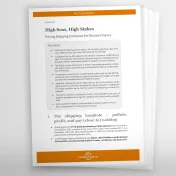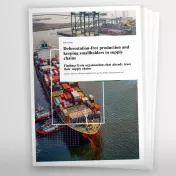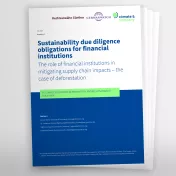Within the framework of the initiative "Securing Food - For a Global Paradigm Shift in Agricultural Policies" FIAN, German National Association of Worldshops and Germanwatch support fair rules for international trade in agricultural goods. It is our opinion that a Global Paradigm Shift in Agricultural Policies is necessary to ensure the human right to food for all human beings and to provide agricultural production with a social, ecological and consequently, sustainable profile. Small-scale agriculture with its unique cultural diversity must be protected because it contributes to food security. Its future existence is threatened. Liberalisation in the South, pushed forward by IMF (International Monetary Fund), World Bank and WTO (World Trade Organisation) and, continuing agricultural protectionism in the North endangers the livelihoods of small farmers. Thus, the rules for international trade in agricultural goods must be reformed in such a way that they work for, not against, small farmers, and thus contribute to combating hunger and securing the human right to food. Therefore, Germanwatch, FIAN Germany and German National Association of Worldshops advocate a far-reaching reform of the WTO Agreement on Agriculture and the introduction of a Development Box in particular. The proposals combine the organisations' different expertise regarding development policy, human rights policy and fair trade, and are intended to be discussed in detail with partners from the South and to be modified, if necessary.
The WTO Agreement on Agriculture
The Agreement on Agriculture must be redressed in order to reduce poverty and hunger in developing countries, particularly in rural areas. Trade should contribute to achieving the UN's 2015 Millennium Development Goal - halving the proportion of people living in utmost poverty and hunger until 2015. The objective stated in the preamble of the Agreement on Agriculture is to establish a fair and market-orientated system for trade in agricultural goods, while taking account of non-trade concerns such as food security and environmental the agreement's content does not yet appropriately reflect this basis.
The Agreement on Agriculture (AoA) establishes reduction commitments concerning market access, domestic support and export subsidies. Measures listed in Annex II (Green Box) are exempted from reduction commitments if they do not or only slightly distort trade. General investment support and support for agricultural resources for small farmers (Art. 6.2. AoA) in developing countries and subsidies accompanied by production restrictions (Art. 6.5. AoA) are exempted as well. The explicit reference to "low-income and resource-poor farmers" in Article 6.2 deserves special attention as it stresses the need for supporting small farmers in specific ways. The "peace clause", in force until the end of 2003 protects domestic support and export subsidies against WTO dispute settlement challenges (Art. 13 AoA).
The AoA has not yet adequately take account of developing countries' problems and the goal of combating hunger, ensuring the human right to food, and addressing the needs of small farmers.
Present regulations in the context of special and differential treatment for developing countries are not sufficient to tackle the problems of developing countries and to meet the needs of small farmers. These regulations do not contribute to achieving food security. To the contrary, the provisions are accommodating towards developed countries' support procedures for their agricultural sectors, especially towards the subsidy policies of the United States and the European Union. In fact, achieving fair rules for trade in agricultural goods requires reversing the differential treatment practice of developed countries.
Trade Liberalisation Threatens Small Farmers and Small-scale Agriculture
Article 20 of the AoA states that the negotiations take account of the most recent experiences when implementing reduction commitments. Non-trade concerns and special and differential treatment should be taken into account as an integral part of the Agreement on Agriculture. The Doha Development Agenda confirmed this explicitly.
A precise and subtle analysis of the impacts of trade liberalisation on small farmers and food security in the South must bear in mind that the WTO is not the only actor. Many of the adverse impacts can be can be traced back to structural adjustment programmes of IMF, regional trade agreements, and progressive national liberalising actors. However, some of the experiences can be directly linked to the WTO Agreement on Agriculture:
- Under the Agreement on Agriculture developed countries can continue their subsidy policy and practice cut-throat competition dumping on the world market to the detriment of the agricultural sector and food security in many developing countries.
- Liberalisation caused an import surge in the food sectors of many developing countries, without providing these countries with the opportunity to expand their agricultural exports.
- In many developing countries food processing and marketing structures vital for national economy and food supply have been destroyed, because they could not compete with cheap imports.
- A general trend towards concentration in the agricultural sector can be observed in many countries. Emerging of large-scale farms has intensified the marginalisation of small farmers, unemployment and poverty due to a lack of social security systems.
Thus, liberalisation of trade in agricultural goods threatens food security and the human right to food. In view of these experiences, the WTO Agreement on Agriculture must be reformed significantly. New safeguards for developing countries and small farmers, export subsidy reductions and changes geared towards securing the human right to food are crucial. Opening markets in the North is not the right way to solve the problems of small farmers caused by trade liberalisation. It could even have adverse effects, if market opening leads to increased export orientation and concentration in the agricultural sector, with large-scale producers marginalising small farmers.
Including Development Concerns as Integral Part in the WTO Agreement on Agriculture
Since the breakdown of the WTO Ministerial in Seattle in 1999 some developing countries and many NGOs have been urging to embody development concerns and specific needs of small farmers in the WTO Agreement on Agriculture. The proposal to include a "Development Box" in the WTO Agreement on Agriculture addresses precisely these concerns. The urgent need for a development box becomes clear in view of the fact that three quarters of the poor and hungry peoplein developing countries live in rural areas and, on average, 70 per cent of the population works in the agricultural sector.
At the Doha Ministerial Conference in November 2001 a meeting of the "Friends of the Development Box" group was held.(1) They found that the agriculture negotiations had ignored the concerns of many developing countries regarding the problems of small farmers. The present WTO trade system also legitimises unfair trade in agricultural goods. Their demand to insert an explicit reference to the so-called Development Box in the Ministerial Declaration was not met. However, the Ministerial Declaration provides that special and differential treatment for developing countries should be an integral part of all negotiating elements in order to take development needs, including food security and rural development, into account effectively. Now it's up to the WTO Members to enliven this commitment.
To change the AoA is an obligation of the global community and the federal government of Germany, which stresses the human right to food in its strategy for combating poverty. These changes are necessary to ensure justice and human rights. No conditions, such as requiring developing countries to make concessions in other trade sectors, shall therefore be attached to these changes.
The Development Box accounts for existing disparities and addresses important development concerns. Our goal is:
- To protect and expand domestic food production in developing countries, in particular production of key staples;
- To protect poor farmers from dumping from developed countries due to subsidised imports;
- To allow developing countries greater flexibility in specifically supporting small farmers;
- To increase employment and promote food security.
Which provisions will be integrated into the AoA depends on the negotiating process. German National Association of Worldshops, FIAN Germany and Germanwatch hold the opinion that the following measures are necessary to achieve the objectives mentioned above:
I. Measures to protect domestic key staples production and small farmers in developing countries from dumping due to subsidised imports. These measures are part of the special and differential treatment provisions.
- Developing countries should be able to prepare a list of products with high significance for food security on the basis of the products' relevance to the promotion of employment and the protection of small farmers' livelihoods. This list comprises key staples and other agricultural products grown mostly by small farmers. Products on this negative list should be exempted from all reduction commitments under the AoA.
- If the import volume exceeds or the import price falls under a certain threshold, the special safeguard mechanism of the AoA allows imposing additional duties. No trade compensation has to be paid to the affected export countries in this case. This safeguard should be expanded to include all developing countries and all agricultural products. At present, only developed countries and a few developing countries can benefit from the special safeguard mechanism.
II. Measures that allow developing countries greater flexibility in promoting rural development and food security and specifically supporting small farmers. These measures are part of the special and differential treatment provisions.
- The de minimis level for developing countries should be raised from presently 10 per cent to 20 per cent. Thus, developing countries could grant subsidies without undertaking reduction commitments, even if these subsidies represent trade distortions. As a result, the scope of developing countries for supporting food security and rural development programmes as well as allowing specific support for small farmers will be extended.
- Additionally, any product-bound subsidy specifically supporting small farmers shall be exempted from reduction commitments.
- Being part of the "Green Box", food security and poverty reduction programmes should be exempted from any and all reduction commitments. These measures include, inter alia, investment in rural infrastructure, employment creation, promotion of product diversification, increase of productivity, compensation for structural adjustment measures, and support of ecological agricultural cultivation methods. These measures should be part of a country's integrated development strategy.
- Measures targeted to support low-income and resource-poor farmers (Art. 6.2 of the AoA) shall be expanded. They should particularly include specified investment promotion, support for electricity and fuels, price-stabilising measures, training courses for small farmers/peasant women and their organisations, measures for the development of local markets and loan programmes.
III. Measures which target areas important for the economic development of developing countries or the promotion of food security. These measures are not part of the special and differential treatment provisions.
- Subsidies shall be completely de-coupled from production and linked with programmes for the development of non-trade concerns such as environmental protection, food security, etc. Strict disciplines are necessary to prevent abuse. Capping must be introduced for direct payments to producers, de-coupled income support payments, and state subsidies for income insurance and security systems; a progressive cutback of these subsidies will follow the capping within the next five years (Annex II, § 5, 6, and 7).
- It is crucial to implement and operationalise the Marrakesh Decision on food importing countries to compensate these countries for the negative impacts due to increased prices on the world market. As one of the instruments provided in the Marrakesh Decision to compensate net food importing countries, food aid should not be decreased, but rather increased in times of high prices on the world market. Additional financial sources must be developed for all four areas of a global food security system: financing instruments for food imports, emergency assistance, structural official development assistance and export credits. Financing can be achieved through export subsidy reductions. Food aid shall never compete with domestic production and the provided food must not contain genetically modified ingredients.
- The WTO shall acknowledge the priority of the human right to food in the preamble of the Marrakesh Agreement. The human right to food is a fundamental human right that grants each human being access to sufficient food in quantity and quality, adapted to cultural habits and free of harmful substances. Thus, a social dimension is introduced into the reform process.
- Export subsidies shall be eliminated. Additionally, clear criteria must be provided concerning food aid, agricultural surplus utilization, export credits, state-trading enterprises, trade support, and support of foreign direct investment. Consequently, dumping and harmful impacts on small farmers' access to their domestic markets will be minimised.
- Future tariff reductions shall be set out on the basis of the "Swiss Formula". It allows bringing tariff rates closer together through a higher rate of tariff peak reductions. To continue tariff reduction on the basis of the Uruguay formula would only lead to marginal reductions and would thus not result in an essential improvement of market access for developing countries.
- Market power of transnational corporations operating in the agricultural sector and its misuse (dumping, inter alia) must be an agenda item during the negotiations. According to Art. VI GATT, dumping is defined as selling one country's products on the market of another country at less than cost of production prices. In future, such dumping must be reduced because of its harmful impact on agricultural production and small farmers. To achieve this goal, dumping assessment is necessary. A multilateral institution shall execute the assessment for each country.
Consequently, the Federal Government of Germany and the European Union must:
- Support a "Development Box" in the WTO agriculture negotiations that allows taking specific measures targeted at support for small-scale farming, especially for low-income and resource-poor farmers.
- Commit significantly higher expenditure to promote rural development in the South and to implement the Marrakesh Decision.
Additionally, the federal government of Germany and the European Union shall take the following urgent initiative in regard to the Fifth Session of the Ministerial Conference in Cancun:
Developing countries shall be granted the right to immediately impose countervailing duties to the extent of the subsidy share of the farmers in OECD countries (share of the total support estimate in gross production value of the agricultural sector, according to OECD assessment) by the WTO Members states. In return, the peace clause would be extended until 2005.
Developing countries need the immediate opportunity to protect themselves against subsidised imports and dumping due to the state support and market power of transnational corporations. Furthermore, this measure must be regarded as compensation for the developed countries' "timeout" in regard to the implementation of reduction commitments. While the developed countries' implementation period ended in 2000, it will continue for developing countries until 2005.
Footnotes:
(1) Cuba, Dominican Republic, El Salvador, Haiti, Honduras, Kenya, Nicaragua, Nigeria, Pakistan, Peru, Senegal, Sri Lanka, Uganda, Zimbabwe. For more details see: http://www.wtowatch.org/library/admin/uploadedfiles/Press_statement_by_Friends_of_the_Development_.doc



